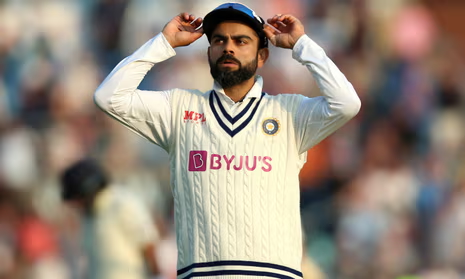In a significant development that has taken the cricketing world by storm, Virat Kohli, the celebrated former captain of the Indian cricket team, has announced his decision to step back from the ongoing Test series against England. This announcement, as reported by Indian Express, comes at a pivotal moment in the series, leaving fans and commentators alike grappling with the potential ramifications of his absence. The Board of Control for Cricket in India (BCCI), through a statement released by its secretary Jay Shah, expressed its respect for Kohli’s decision. The BCCI along with the team management has shown unwavering support for Kohli, asserting their confidence in the team’s capability to rise to the occasion and deliver outstanding performances in the remaining matches of the series.
This decision by Kohli to prioritize personal matters over his cricketing commitments marks a rare departure from his well-documented dedication to the sport and representing his country. Kohli’s withdrawal, citing the need to attend to personal issues that require his immediate presence, underscores the sometimes overlooked personal sacrifices made by professional athletes. The BCCI and the senior national selection committee have both supported Kohli’s decision, highlighting their understanding of the balance between professional commitments and personal life.
This occasion is notably the first in Kohli’s distinguished career that he will miss a home series, highlighting the significant nature of his personal reasons. The series, which is currently evenly matched at 1-1 after a strong showing by India in Vizag, had seen the selectors opting to maintain a stable team structure, banking on the momentum from the previous win. Kohli’s absence, therefore, introduces an unexpected variable into the team’s strategy and composition.
Compounding the team’s challenges is the injury to middle-order batsman Shreyas Iyer. Iyer has been sidelined for the remaining three Tests due to issues with stiffness in his back and groin pain that emerged during play. The responsibility of overseeing his recovery has been assigned to the National Cricket Academy in Bengaluru. This development adds another layer of complexity to the team’s preparations, as Iyer’s absence removes a key player from the lineup.
The implications of these developments are manifold. For one, Kohli’s departure from the series represents a significant loss for the Indian team, both in terms of his prowess on the field and his leadership and experience. As a player who has often been the backbone of India’s batting lineup, his absence leaves a void that will require strategic adjustments and presents an opportunity for other players to step up and fill. Similarly, Iyer’s injury deprives the team of a versatile player capable of stabilizing the middle order, further testing the depth and resilience of India’s batting resources.
Moreover, these events come at a time when the Indian cricket team is striving to assert its dominance in the Test format, making every match and series critical to its ambitions. The team’s ability to adapt to these unexpected changes, therefore, will be closely watched by fans and analysts, offering a stern test of its depth, talent, and mental fortitude.
In the broader context, such instances of players prioritizing personal needs over professional commitments highlight the evolving landscape of modern sports, where the well-being and mental health of athletes are gaining recognition as critical components of their overall performance and longevity in their careers. The support extended by the BCCI and the selection committee to Kohli’s decision is indicative of a more empathetic and holistic approach to managing players, acknowledging the demands placed on them and the importance of maintaining a balance between their professional and personal lives.
As the Indian cricket team moves forward without two of its key players, the focus will inevitably shift to those who are called upon to fill the void. The situation presents a unique challenge but also an opportunity for young and fringe players to showcase their talent and make a case for their inclusion in the team’s long-term plans. How the team navigates this period of transition and uncertainty will offer valuable insights into its character, resilience, and depth, setting the tone for its future endeavors on the international stage.
In conclusion, the withdrawal of Virat Kohli from the Test series against England, coupled with Shreyas Iyer’s injury, represents a pivotal moment for Indian cricket. It underscores the unpredictable nature of sports, where personal circumstances and unforeseen challenges can swiftly alter the course of a team’s journey. As India looks to adapt and overcome these setbacks, the series against England promises to be a compelling showcase of the team’s resolve and its players’ ability to rise to the occasion in the face of adversity.

